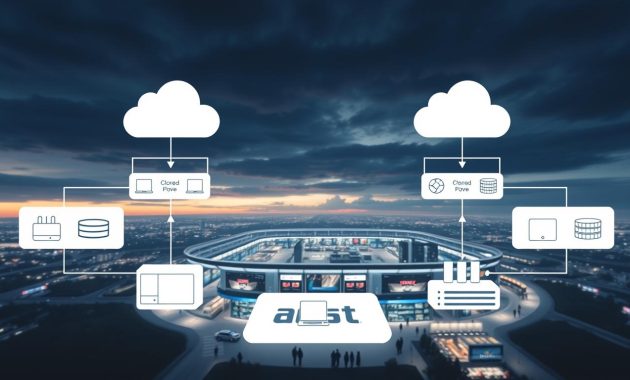In the realm of digital commerce, the imperative to scale your e-commerce platform in tandem with increased traffic and sales is paramount. Cloud servers emerge as a pivotal solution, offering a flexible and economically viable framework for scaling. They provide the requisite infrastructure for business expansion, enabling the dynamic adjustment of resources to meet evolving demands. This adaptability makes cloud servers an exemplary choice for enterprises aiming to enhance their online footprint with scalable e-commerce platforms and dependable e-commerce solutions.
Cloud servers facilitate the creation of a resilient and efficient e-commerce platform, adept at accommodating the burgeoning needs of your business. They ensure a seamless shopping experience for your clientele, embodying the essence of scalable e-commerce platforms and effective cloud servers. These elements are indispensable for the success of e-commerce endeavors.
Understanding Cloud Servers and Their Benefits
In the realm of e-commerce, the significance of cloud servers cannot be overstated. These virtual servers operate within a cloud computing framework, offering on-demand access to computing resources. This adaptability is a cornerstone of the cloud server benefits, enabling the scaling of resources to align with fluctuating demands.
The cost efficiency of cloud infrastructure stands out as a major advantage. Users only incur costs for the resources they utilize, a feature that is pivotal for e-commerce platforms. These platforms often face unpredictable traffic patterns and variable resource demands, making cost control a critical factor.
Furthermore, cloud servers are instrumental in delivering enhanced performance and speed. For e-commerce, where slow loading times can result in lost sales, this is a critical benefit. Cloud servers ensure that websites operate at peak efficiency, even during periods of high traffic.
The primary advantages of cloud servers encompass:
- Scalability and flexibility
- Cost efficiency and reduced costs
- Enhanced performance and speed
By grasping the benefits of cloud servers, you can make strategic decisions for your e-commerce platform. This ensures a superior customer experience, a cornerstone of success in the competitive e-commerce landscape.
Key Features of Scalable E-Commerce Platforms
In the development of a scalable e-commerce platform, it is imperative to focus on the pivotal attributes that empower your platform to manage elevated traffic and sales volumes. A scalable e-commerce platform necessitates features such as elasticity and auto-scaling, which enable it to dynamically adjust to fluctuations in traffic. This adaptation ensures that your platform can adeptly manage unforeseen surges in demand without compromising its performance.
Some of the key features of scalable e-commerce platforms include:
- Elasticity and auto-scaling to handle changes in traffic
- Load balancing to distribute workload evenly across multiple servers
- Integration with APIs and microservices to add new features and services
These attributes are fundamental for guaranteeing that your platform can adeptly manage increased traffic and sales, while also ensuring a seamless user experience. By integrating these scalable e-commerce features, you can ensure that your platform is adequately prepared to meet the demands of an expanding business.
Load balancing is another critical feature of scalable e-commerce platforms, as it ensures that no single server is overwhelmed with requests. This strategy helps to prevent downtime and guarantees that your platform remains accessible to customers at all times. By leveraging load balancing and elasticity, you can create a platform that is highly available and scalable, thereby enhancing the user experience for your customers.

By incorporating these key features, you can create a scalable e-commerce platform that is well-equipped to handle the demands of a growing business. With elasticity, load balancing, and integration with APIs and microservices, you can ensure that your platform is highly available, scalable, and provides a seamless user experience for your customers.
Choosing the Right Cloud Service Provider
In the realm of e-commerce, the selection of a cloud service provider is a critical decision, with numerous options available. Renowned entities such as Amazon Web Services (AWS), Microsoft Azure, and Google Cloud Platform (GCP) present a spectrum of services and functionalities. These are pivotal in constructing and managing an e-commerce platform that is both scalable and secure.
During the evaluation process, security and adherence to compliance standards are paramount. It is imperative to safeguard your platform and customer data from cyber threats. Moreover, it is crucial to assess the customer support and reliability of the provider. A provider that offers prompt assistance and maintains high uptime levels is essential.
Several factors must be considered when selecting a cloud service provider:
- Scalability and flexibility to meet changing business needs
- Robust security measures to protect against cyber threats
- Reliable customer support and technical assistance
- Compliance with regulatory requirements and industry standards
By meticulously evaluating these factors and aligning them with your specific business needs, you can select a cloud service provider that fulfills your requirements. This choice is instrumental in establishing a successful and secure e-commerce platform.
Designing Your E-Commerce Architecture
In the realm of e-commerce architecture, the integration of cloud architecture emerges as a pivotal factor, crucial for the expansion of your online store. A meticulously designed e-commerce architecture is instrumental in facilitating scalability, cost reduction, and enhanced customer satisfaction. It necessitates the creation of a framework that is both scalable and adaptable, capable of accommodating the evolving demands of your business.
The selection of an appropriate architectural approach is a critical step in the design process. Options range from a monolithic architecture, where all components are unified within a single entity, to a microservices architecture, characterized by the collaboration of multiple, independent services. Microservices are particularly favored for their inherent flexibility and scalability, attributes that are highly beneficial for e-commerce platforms.
Adherence to certain best practices in cloud architecture is imperative:
- Employing load balancing to evenly distribute traffic and enhance performance
- Implementing auto-scaling to dynamically adjust resource allocation based on demand
- Utilizing cloud-native services to minimize costs and optimize efficiency
Regarding database selection, focus on scalable solutions such as NoSQL databases or cloud-native databases. These are designed to handle voluminous traffic and extensive data volumes. By adhering to these best practices and selecting an optimal architecture, your e-commerce platform will be positioned for scalability, efficiency, and ease of maintenance. 
Implementing Security Measures
In the realm of e-commerce, the imperative to safeguard your enterprise and clientele through stringent security protocols cannot be overstated. The establishment and upkeep of a secure e-commerce platform necessitate the adoption of advanced security measures. These include the utilization of encryption, access controls, and secure data transmission protocols to safeguard sensitive information.
Adherence to regulatory standards is paramount for fostering trust and averting potential legal repercussions. For instance, platforms handling payment card information must adhere to the Payment Card Industry Data Security Standard (PCI-DSS). Engaging in regular security audits and backups is instrumental in identifying vulnerabilities and ensuring uninterrupted business operations in the event of a security breach.
Consideration of the following security measures is imperative:
- Encrypting sensitive data, both in transit and at rest
- Implementing access controls, such as multi-factor authentication
- Conducting regular security audits and penetration testing
- Maintaining compliance with relevant regulatory standards, such as PCI-DSS and GDPR
By prioritizing security measures, data protection, and compliance, you can ensure the enduring success and reputation of your e-commerce platform. It is crucial to regularly review and update your security protocols to remain vigilant against emerging threats and uphold customer trust.
Optimizing Your Platform for Performance
To ensure a seamless user experience and drive conversions, optimizing your e-commerce platform’s performance is crucial. Leveraging performance optimization techniques is essential to identify areas for improvement and implement data-driven solutions. Utilizing monitoring tools provides valuable insights into your platform’s performance, detecting bottlenecks and opportunities for growth.
A key aspect of performance optimization is latency reduction. Minimizing page load times significantly enhances the user experience, leading to increased engagement and conversions. Strategies for reducing latency include implementing content delivery networks (CDNs) and caching. These can be easily integrated into your platform using various tools and services.
- Utilizing monitoring tools to track performance metrics and identify areas for improvement
- Implementing latency reduction strategies, such as CDNs and caching, to minimize page load times
- Adopting continuous integration and deployment practices to ensure seamless updates and improvements
By prioritizing performance optimization and leveraging the right tools and strategies, you can create a seamless and efficient user experience. This drives conversions and revenue for your e-commerce platform.
Future Trends in Cloud-Based E-Commerce
In navigating the trajectory of your e-commerce platform, it is imperative to remain informed about the evolving trends and technologies that are redefining the sector. The horizon of cloud-based e-commerce is teeming with promising developments, from the fusion of artificial intelligence (AI) and machine learning to the escalating significance of edge computing.
The incorporation of AI and machine learning holds the potential to revolutionize your e-commerce endeavors. These cutting-edge technologies can enhance customer personalization, forecast demand trends, and streamline mundane tasks, thereby boosting operational efficiency and revenue. By tapping into the cloud’s extensive computational resources, you can fully exploit the capabilities of these sophisticated analytics and optimization frameworks.
Furthermore, the ascendance of edge computing is set to redefine the paradigm of content delivery and data processing within your e-commerce platform. By processing data proximal to the user, edge computing can diminish latency and expedite response times, thereby ensuring a seamless and ultra-responsive customer experience. As consumer expectations for immediate satisfaction escalate, the integration of edge computing will be pivotal in sustaining a competitive advantage.
Additionally, the escalating emphasis on sustainability in cloud computing is a trend that warrants consideration. Amidst intensifying environmental concerns, numerous e-commerce entities are endeavoring to diminish their ecological impact and adopt more environmentally conscious practices. By opting for cloud service providers with a pronounced commitment to sustainability, you can underscore your brand’s environmental stewardship and attract eco-conscious consumers.
By proactively engaging with these trends and embracing the most recent advancements in cloud-based e-commerce, you can guarantee that your platform remains pertinent, robust, and flexible in the forthcoming years.
